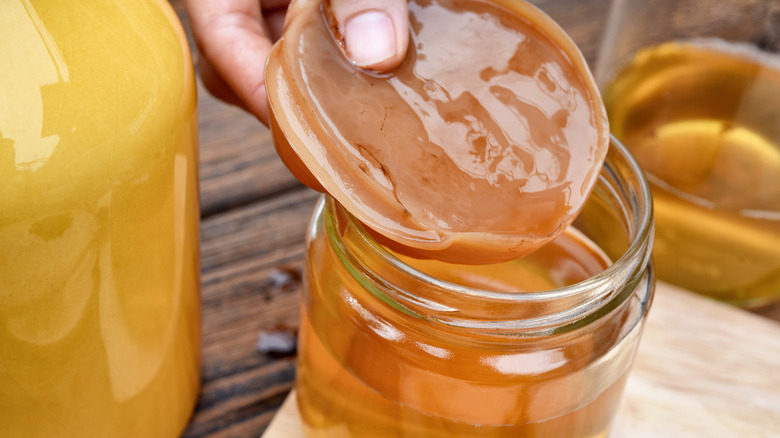The Fizzy History Of Kombucha
Kombucha has increased in popularity over the past several years, with its medicinal properties celebrated by new converts across the globe. People either love or hate the fizzy fermented tea, but despite the haters, sales have skyrocketed. Bottles and cans of kombucha can now be found in most mainstream grocery stores, and the global market value of the kombucha industry was $2.64 billion in 2022 (per Virginia-Pilot).
Food Navigator reports that many people are ditching sugary sodas in favor of kombucha, and with good reason. A regular Coca-Cola has 39 grams of sugar, while most kombucha options only contain up to 10 grams (per Men's Health). With so many benefits to drinking kombucha, you might consider giving up that diet soft drink full of artificial sweeteners and switch to the "booch."
It may seem like kombucha is a newcomer to the beverage world, but it has actually been around for a very long time. People have been fermenting tea for centuries in much the same way modern brewers do today. The long history of kombucha is fascinating, if not as murky as the drink.
The 'Tea of Immortality'
To brew kombucha, you need sugar, black or green tea, water, and a culture known as a SCOBY. SCOBY, which stands for Symbiotic Culture of Bacteria and Yeast, is a slimy, meaty disc, and it's what allows the brew to ferment and what gives kombucha a slightly acidic flavor (via Healthline). There are several theories about when kombucha was discovered, but no way to prove any.
One theory says that a 2nd-century Manchurian emperor, Qin She Huang, had kombucha given to him by an alchemist. So convinced of its life-extending properties, the emperor dubbed the drink "The Tea of Immortality" (via YeaBucha). The fermented brew caught on, and according to kombucha maker GT's, soldiers from different countries would drink the tea during times of war and exchange the culture amongst other soldiers, allowing its popularity to spread around the world.
And spread around the world, it did. The Russians were big booch fans until rationing during WWII kept the ingredients from entering the country, and in Italy, brewers would steal holy water to make the tea (via Revolution Fermentation). The Italians, in particular, were so respectful of the culture that they attached a superstition to the SCOBY: Whoever sold or discarded it would be cursed.
Kombucha in the 21st century
Kombucha caught the attention of experts in the 1960s after a study in Switzerland uncovered its health benefits (via MeBooks). Still, its popularity didn't take off until the 1990s after a small number of people started sharing their SCOBYs (if you've ever owned a SCOBY, you'll understand why they are meant to be shared — they grow!). GT's Kombucha began producing it commercially shortly after that. Kombucha has become so popular now that Slate once dubbed it the "most liberal product in America" — kombucha shared a place on the list with Whole Foods and Birkenstocks — and its popularity is expected to continue to grow.
While the fermentation process does include alcohol as a by-product, the percentage of alcohol in commercially made kombucha is very low at 0.5%, allowing those who choose to avoid alcohol to enjoy the fizzy beverage safely — although it may be a problem for recovering alcoholics (per Banyan Treatment Centers).


